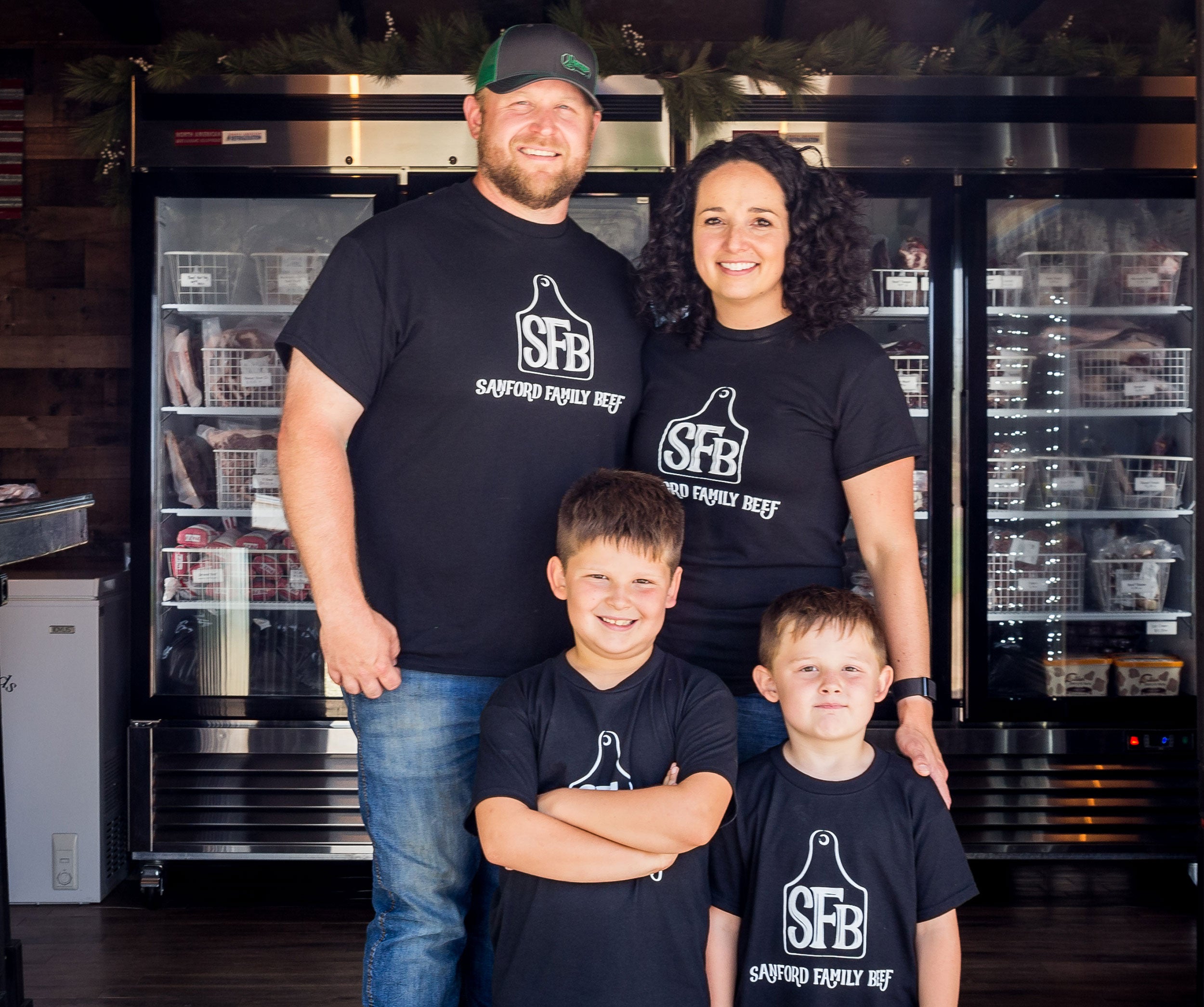Caregiving is a common role in agriculture, yet it becomes more challenging when medical diagnoses necessitate taking on care of loved ones. The emotional, physical, and mental toll can be overwhelming — whether you’re tending to a parent with health concerns, raising children with special needs, or navigating personal health struggles. For many caregivers, the constant juggling of responsibilities leaves little room for self-care, leading to burnout.
Jackie Sanford, Heather Lifsey, and Becky Heim are three women balancing caregiving for their loved ones with their own well-being, families, and careers in agriculture. Their stories offer valuable firsthand insights into the unique stresses caregivers face and practical strategies for coping.
The weight of caring for a parent: Riding an emotional rollercoaster
The diagnosis of her mom’s early-onset Alzheimer’s at age 53 marked the beginning of a deeply emotional journey for Jackie Sanford. She and her husband, Chris, and two young sons, have developed Sanford Family Beef in Parma, Michigan, over the last five years alongside their busy careers.
Jackie’s experience with her mother highlights the heavy emotional burden many face when they transition from a daughter/son to caregiver. As Jackie said, “I had to learn what grief is. It wasn’t just the sadness of losing my mom, but the small things — like not wanting to take down the Christmas tree because it reminded me of her favorite holiday.”
It took a mindset coach to help Jackie understand the grief journey and find ways to cope.

One of the most difficult aspects of caregiving is the emotional ambushes – moments of grief and frustration that come unexpectedly. For Jackie, the key to navigating these emotions was recognizing them as part of the journey.
“Grief ambushes you. You have to ride it out and learn how to take care of yourself. For me, that means letting the tears come,” she explained.
A crucial strategy she employed was to make self-care a priority, despite her hectic schedule. Through regular exercise, including CrossFit at 5 a.m., deep breathing exercises, and writing down something good that happened each day — she was able to manage her stress and build the mental resilience needed for tough days.
Another important lesson Jackie learned was the power of asking for help.
“You can’t do it all on your own,” she said, noting that she had to rely on her family and a close-knit support system. She also realized the importance of open communication with her husband. “I would tell him, ‘I’m only at 10 percent tonight, can you handle the other 90 percent?’ ” This vulnerability allowed her to balance her family and business responsibilities without sacrificing her own well-being.
The stress of raising exceptional children: Managing multiple diagnoses
Heather Lifsey, a longtime agricultural advocate and mother of three in North Carolina, is no stranger to the challenges of caregiving. Her oldest son was diagnosed with autism at age 3, her middle son with diabetes at 3, and her youngest is now being evaluated for learning disabilities.
The emotional weight of being a caregiver to exceptional children can feel isolating — and there’s no manual for any of it. As Heather explained, “It was hard when they said out loud my son had autism. You always have hope, but hearing it from a doctor makes it real, and it changes everything.”
Heather found that building a community was essential for managing the overwhelming responsibilities of caregiving. She reached out to support groups like the Autism Society of North Carolina and the Diabetes Association, which helped her connect with others going through similar experiences.
“You can’t do this alone. You have to find people who understand,” she stressed. Heather also shared how learning to advocate for her children in new ways – like monitoring her son’s blood sugar levels — was part of the learning curve that caregivers face.
Another critical tool for Heather has been exercise. Initially, she started working out to lose baby weight, but she soon realized it was about more than just physical health.
“Exercise has been the biggest stress reliever for me,” Heather said. “It’s not just about the body — it’s about my emotional health. When I miss my workout, I’m edgier and more overwhelmed.”
She prioritizes early morning workouts before her children wake up, understanding that taking time for herself fills her emotional “bucket,” enabling her to care for others. She’s also learned that therapy and anxiety medication are part of her solution.
The stress of personal health struggles: Navigating illness
Rocky Oak Farms’ Becky Heim’s 2024 cancer diagnosis added another layer of caregiving stress to an already busy life. At 42, Becky was diagnosed with stage two colorectal cancer after ignoring symptoms for some time. She underwent 12 rounds of chemotherapy and a major surgery, all while balancing her responsibilities as a mother of two, wife, career, and farm business owner. The grueling treatments forced Becky to learn to ask for and accept help, a lesson that many of us find difficult.
“At first, I didn’t want to ask for help, but when you feel like crap, you just don’t care anymore. Quiet, sleep, and support became vital,” she said.
Becky’s approach to managing her health challenges involved being kind to herself and adjusting her expectations. “You’re not going to get everything done. You have to accept that.” She found solace in support groups, both online and in-person, where she could connect with others facing similar health issues. “The social aspect helped. You’re not alone in this.”
She also took time to engage in activities she enjoyed, such as spending time outside on her farm.
“Even just walking to the barn made a difference,” Becky reflected. She’s now in remission and back to enjoying a full life with her family in Michigan.
Coping strategies for caregivers: Finding balance and prioritizing self-care
Whether you’re caring for a parent, a child with special needs, or managing your own health, there are common threads in the ways Jackie, Heather, Becky learned to manage stress more effectively.
- Ask for help: The importance of building a support system cannot be overstated. Whether it’s leaning on family, friends, or professional caregivers, asking for help is a critical step to reducing stress and burnout.
- Prioritize self-care: Exercise, relaxation, and finding time to engage in activities that nourish your soul are essential for maintaining your well-being. As Jackie learned, self-care isn’t selfish – it’s necessary for long-term survival in caregiving roles.
- Set boundaries and manage expectations: It’s important to recognize that you can’t do everything. Set realistic expectations for yourself, adjust your business, and communicate openly with those around you about what you need.
- Practice mindfulness and stress-reduction techniques: Deep breathing, yoga, and getting outside can help manage the daily stress of caregiving. When the pressure builds, these tools can help caregivers stay grounded.
- Accept the seasons of life: As Heather points out, seasons change. While caregiving might feel overwhelming now, understanding that it won’t always be this way can offer hope. Take it one step at a time and trust that things will evolve.
Caregiving is a monumental responsibility that brings significant stress. The key to managing this lies in finding balance — through community, self-care, and the ability to ask for help. It is a journey — and by embracing the tools and strategies that work for you, it’s possible to navigate the ups and downs while maintaining your own mental and physical health.
Michele Payn speaks and writes to help the people of agriculture have tough conversations about managing stress, connecting with consumers, and making sense of science. Learn more at causematters.com or follow @mpaynspeaker on social media.


